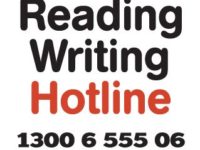Community Colleges Australia (CCA) and Byron Community College have been highlighted in a national news story about regional and rural adult literacy. The story – which focusses on the challenge in reaching regional and rural people with low literacy, because of changes in television viewing – appeared in Brisbane’s Courier Mail as well as a number of regional newspapers in Queensland and New South Wales.
The story by journalist Hannah Busch begins:
“It’s a jingle that is impossible to forget. 1300 6 555 06. One three double oh, six triple fiiiiiive ohhh six. If you've watched television ads over the past 25 years, it's almost certainly playing in your head. That's very much on purpose, and for a very good reason. The infamous number is for the Reading Writing Hotline – a service that helps adults with literacy and numeracy problems access help and education services.”
According to the article and Hotline Manager Vanessa Iles, “The changing way we watch television presents a unique problem for the people behind the hotline. They can't rely on social media or online advertising if the people who need to see the ad struggle to read it.”
This is especially so in regional and rural areas. The article describes a case study of a woman who used the Hotline to obtain a referral to Byron Community College, where she has almost finished a Certificate III in Disability Support. The student had “suffered a stroke at birth and was later diagnosed with cerebral palsy and epilepsy as a result. Both conditions contributed to a learning disability that she has dealt with through her life.”
The article quotes CCA’s CEO, Dr Don Perlgut about the educational challenges facing people living in regional and rural Australia: “It's really about education. There is a direct correlation between literacy and education. The more remote you go, the less your education attainment is. It is connected purely and simply to accessibility. They are poor, they are regional, they are remote and often they are older," Don Perlgut said.
The article continues: “Don said 10 to 20% of the population threatened to be left behind thanks to influences such as interrupted education, a lack of basics such as reliable internet and access to appropriate training services. Don recounted the story of one student [a finalist in the CCA 2017 Student of the Year Awards] who decided to take a Microsoft Word course. The security guard used the writing skills he learned through Word to help secure a better-paying desk job.”
Hotline Manager Vanessa Iles said “up to 50% of calls were made by professionals such as nurses, and even by bosses noticing a problem with staff. We talk with employers about not stigmatising." She urged anyone looking for more information to phone the hotline.
(CCA's CEO, Dr Don Perlgut, is on the Reading Writing Hotline's Steering Committee.)





